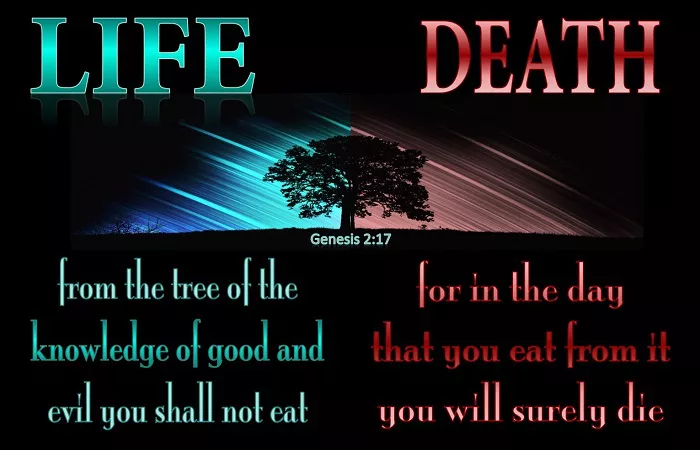Read the Daily Bible Verse Genesis 2:17 To Strengthen Your Spiritual Journey.
The second chapter of Genesis is foundational to the Christian understanding of creation, human origins, and the relationship between God and humanity. Genesis 2:17, in particular, plays a crucial role in the narrative by introducing the concept of divine command and the consequences of disobedience. This verse, part of the story of Adam and Eve in the Garden of Eden, has been subject to extensive theological analysis and interpretation. This article will explore the meaning of Genesis 2:17, its context, its application in life, and its relevance in comparison to other biblical texts and modern-day contexts.
The Context on Genesis 2:17 KJV
Genesis 2:17 states: “But of the tree of the knowledge of good and evil, thou shalt not eat of it: for in the day that thou eatest thereof thou shalt surely die.” This directive from God comes after He placed Adam in the Garden of Eden, instructing him to tend and keep it. Adam was given freedom to eat from any tree in the garden, except from the tree of the knowledge of good and evil. The immediate context of this verse highlights God’s command and the explicit consequence of disobedience: death.
The broader context of Genesis 2 establishes the idyllic setting of the Garden of Eden, where Adam, and subsequently Eve, live in harmony with God’s creation. This chapter transitions from the more general account of creation in Genesis 1 to a more detailed account of humanity’s creation and early experiences. The narrative sets the stage for the human condition, including free will, responsibility, and the potential for both obedience and disobedience.
The Genesis 2:17 Meaning
Genesis 2:17 introduces several key theological concepts. First, it underscores the sovereignty of God as the ultimate lawgiver. The command to refrain from eating the fruit of a specific tree is not arbitrary; it represents a boundary set by God to test human obedience. Second, the “knowledge of good and evil” is often interpreted as a symbol of moral discernment and autonomy. By forbidding the consumption of the fruit, God is establishing that moral judgment should be derived from divine instruction, not human initiative.
The consequence of death is significant. It implies both a physical and a spiritual death. Physical death represents the mortality of humans, which contrasts with the initial intention of eternal life in communion with God. Spiritual death refers to the separation from God that results from sin, a theme that recurs throughout the Bible.
See Also: What Does Genesis 2:8 Mean?
Genesis 2:17 Application in Life
The directive in Genesis 2:17 can be applied to various aspects of human life. It teaches the importance of obedience to divine commandments and the repercussions of straying from them. In a broader sense, it reflects the principle that actions have consequences, and that choices made in defiance of divine will lead to negative outcomes.
This passage also speaks to the human condition of curiosity and the desire for autonomy. In life, individuals often face choices that test their adherence to moral and ethical standards. Genesis 2:17 serves as a reminder that while humans are endowed with free will, they are also accountable to a higher moral authority.
Comparison with Other Biblical Texts
Genesis 2:17 can be compared with other biblical texts that discuss obedience and disobedience. For example, in Deuteronomy 30:19, Moses sets before the Israelites a choice between life and death, blessing and cursing, urging them to choose life by loving and obeying God. Similarly, in the New Testament, Romans 6:23 contrasts the wages of sin, which is death, with the gift of God, which is eternal life in Christ Jesus.
These comparisons highlight a consistent biblical theme: the consequences of sin and the offer of redemption. While Genesis 2:17 focuses on the immediate consequence of disobedience, other texts provide a broader perspective on the possibility of forgiveness and restoration through repentance and faith.
Modern-Day Relevance
In today’s world, the themes of Genesis 2:17 remain relevant. The struggle between following divine guidance and exercising human autonomy is evident in various ethical, social, and personal dilemmas. Issues such as environmental stewardship, bioethics, and social justice can be viewed through the lens of obedience to divine principles versus human judgment.
Furthermore, the concept of moral boundaries is pertinent in an age where relativism often challenges absolute truths. Genesis 2:17 serves as a reminder of the importance of adhering to moral absolutes as defined by a higher authority.
Conclusion
Genesis 2:17 is a pivotal verse that encapsulates the themes of divine command, human responsibility, and the consequences of disobedience. It offers profound insights into the relationship between God and humanity, the nature of sin, and the human condition. By exploring its meaning, context, and application, we gain a deeper understanding of the foundational truths of the Christian faith and their relevance in contemporary life.
Genesis 2:17 Commentary
Various biblical commentaries have delved into the intricacies of Genesis 2:17. Scholars have debated the nature of the tree of the knowledge of good and evil, the implications of the command, and the significance of the resulting death. Augustine, in his work “The City of God,” interpreted the tree as a symbol of divine wisdom, emphasizing the importance of reliance on God’s guidance. Modern theologians have explored the psychological and existential dimensions of the passage, considering the tree as a metaphor for the human quest for knowledge and the inherent risks of overstepping divine boundaries.
In summary, Genesis 2:17 is a rich and complex verse that continues to inspire theological reflection and practical application. Its enduring relevance speaks to the universal human experience of choice, responsibility, and the pursuit of a life aligned with divine will.


